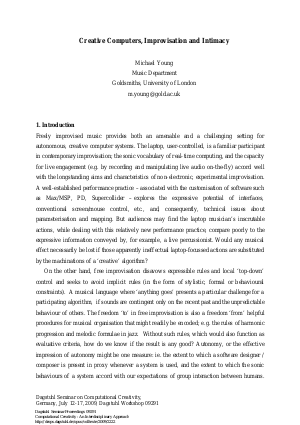Creative Computers, Improvisation and Intimacy
Author Michael Young
-
Part of:
Volume:
Dagstuhl Seminar Proceedings, Volume 9291
Part of: Series: Dagstuhl Seminar Proceedings (DagSemProc) - License:
 Creative Commons Attribution 4.0 International license
Creative Commons Attribution 4.0 International license
- Publication Date: 2009-10-07
File

PDF
DagSemProc.09291.12.pdf
- Filesize: 38 kB
- 7 pages
Document Identifiers
Subject Classification
Keywords
- Computational creativity
- improvisation
- intimacy
- composition
- live algorithm
- neural network
- computer music
- adaptation
Metrics
- Access Statistics
-
Total Accesses (updated on a weekly basis)
0Document
0Metadata
Abstract
Autonomous musical machine partners, ‘live algorithms’, are able to collaborate with human improvisers on an equal footing. Adaptability can be a significant factor in human/machine interaction in this context. Intimacy is an additional factor; intimacy might be achieved if human and machine performers can adapt to each other and learn from one another. Previously associated in computer music with ideas of embodiment and HCI, ‘intimacy’ as more widely understood, refers to the interpersonal process enjoyed between individuals, in which personal self-disclosure finds validation through a partner’s response. Real intimacies are learned over time, not designed, and are based upon an evident reciprocity and emergent mutuality. In the context of musical expression, a social – rather than a biological/technological –discourse can be applied to live algorithms with a capacity for learning. This possibility is explored with reference to the author’s various improvisation/composition systems including au(or)a, piano_prosthesis, and oboe_prosthesis.
Cite As Get BibTex
Michael Young. Creative Computers, Improvisation and Intimacy. In Computational Creativity: An Interdisciplinary Approach. Dagstuhl Seminar Proceedings, Volume 9291, pp. 1-7, Schloss Dagstuhl – Leibniz-Zentrum für Informatik (2009)
https://doi.org/10.4230/DagSemProc.09291.12
BibTex
@InProceedings{young:DagSemProc.09291.12,
author = {Young, Michael},
title = {{Creative Computers, Improvisation and Intimacy}},
booktitle = {Computational Creativity: An Interdisciplinary Approach},
pages = {1--7},
series = {Dagstuhl Seminar Proceedings (DagSemProc)},
ISSN = {1862-4405},
year = {2009},
volume = {9291},
editor = {Margaret Boden and Mark D'Inverno and Jon McCormack},
publisher = {Schloss Dagstuhl -- Leibniz-Zentrum f{\"u}r Informatik},
address = {Dagstuhl, Germany},
URL = {https://drops.dagstuhl.de/entities/document/10.4230/DagSemProc.09291.12},
URN = {urn:nbn:de:0030-drops-22222},
doi = {10.4230/DagSemProc.09291.12},
annote = {Keywords: Computational creativity, improvisation, intimacy, composition, live algorithm, neural network, computer music, adaptation}
}
